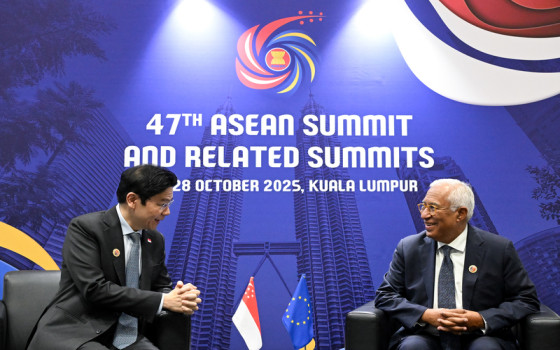
The European Union and China: Talks on the sidelines of ASEAN addressed climate action, rebalancing trade and economic relations, and the war in Ukraine.

- Europe and Arabs
- Monday , 27 October 2025 9:53 AM GMT
Brussels: Europe and the Arabs
European Council President António Costa met with Chinese Premier Li Keqiang on the sidelines of the Association of Southeast Asian Nations (ASEAN) summit in Kuala Lumpur. In a statement issued Monday morning by the federal institutions in Brussels, Costa said, "We discussed bilateral relations between the European Union and China, as well as multilateral and global issues.
I emphasized the importance the European Union attaches to a constructive and stable relationship with China, and our readiness to strengthen cooperation to address global challenges.
I emphasized the need to keep climate action at the top of our agenda. The upcoming COP30 climate conference in Brazil will provide an opportunity for the European Union and China to demonstrate ambitious leadership to achieve a successful outcome.
I emphasized the need for concrete progress as a follow-up to the EU-China summit, particularly to rebalance trade and economic relations.
I expressed my deep concern about China's expansion of export controls on essential raw materials and related goods and technologies. I urged it to restore smooth, reliable, and predictable supply chains as soon as possible.
I also raised the issue of Russian aggression in Ukraine. I expressed the European Union's hope that China would contribute to ending this war. This war poses an existential security threat to the European Union. The European Union will continue to increase pressure on Russia."
The President of the European Commission Ursula von der Leyen addressed the issue of relations with China in her speech at the Berlin Global Dialogue conference last Saturday, saying, "China has significantly tightened export controls on rare earths and battery materials. This is, at least to some extent, part of a broader economic dispute between China and the United States. But it has a significant impact on us here in Europe. We all recognize the importance of rare earths for our industries—whether for cars, semiconductors, or military equipment. The decisions announced by the Chinese government on October 9 pose a significant risk. In essence, these measures will severely hamper other countries' ability to develop their rare earth industries. This threatens the stability of global supply chains and will have a direct impact on European companies. Considering that over 90% of our consumption of rare earth magnets comes from China, you understand the risks facing Europe and its most strategic industrial sectors, from cars to industrial engines, from defense to space, from AI chips to data centers. In the short term, we are focused on finding solutions with our Chinese counterparts. But we are ready to use all the tools at our disposal to respond when needed." We will work with our G7 partners to coordinate our response.
But we must also view this as a structural challenge. Our response must be proportionate to the scale of the risks we face in this area. That's why I can announce that we are working on a new RESourceEU plan – modeled on the REPowerEU initiative that helped us overcome the energy crisis together. The goal is to secure access to alternative sources of essential raw materials in the short, medium, and long term for our European industry. It starts with the circular economy. Not for environmental reasons, but to exploit the essential raw materials already present in products sold in Europe. Some companies can recycle up to 95% of the essential raw materials used in batteries. This means extracting valuable raw materials, reducing waste, and promoting sustainable resource management. We will focus on everything from joint procurement to storage. We will boost investment in strategic projects to produce and process essential raw materials here in Europe. We will accelerate work on essential raw materials and invest in projects that Europe can benefit from around the world through a "global gateway." The "global gateway" is in our own interest, but also in the shared interest of our partners and our global commons. This represents a departure from Europe's traditional caution, but the world we face today rewards speed, not hesitation. Because today's world is unforgiving. And the global economy is very different from what it was even a few years ago. Europe can no longer do things the same way. We learned this lesson the hard way with energy; we won't repeat it with essential materials. So, now is the time to accelerate action and take the necessary measures. Whether in energy or raw materials, defense or the digital sphere, Europe must strive for its independence. This is our moment to do so. The picture I have painted today is bleak. It is the rapid fragmentation of the global economy that should sound alarm bells. But Europe has a plan, and it represents a credible and attractive economic opportunity for partners around the world. In an era of geoeconomic instability












No Comments Found